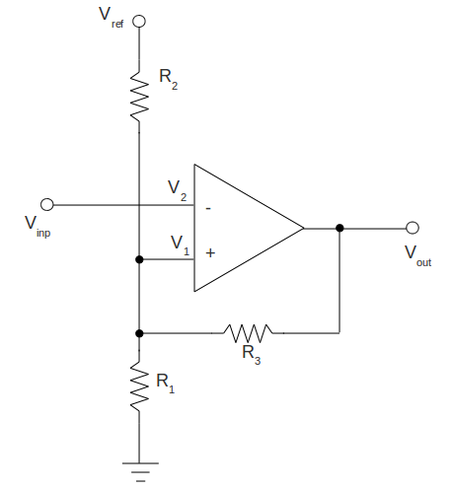Difference between revisions of "GradFinalLab RS"
Jump to navigation
Jump to search
| Line 22: | Line 22: | ||
==Identify the input voltage threshold levels at which a <math> V_{in}</math> will produce <math>V_{out} \approx V_{cc}</math>== | ==Identify the input voltage threshold levels at which a <math> V_{in}</math> will produce <math>V_{out} \approx V_{cc}</math>== | ||
| − | The theory does say: | + | The theory does say (ch. 10.19 The Schmitt Trigger R. Simpson "Introductory electronics for scientists and engineers"): |
| + | |||
| + | <math>V_2 = \frac{R_{123}}{R_2}V_{ref} + \frac{R_{123}}{R_3}V_{out}</math> | ||
1) if the output is high: | 1) if the output is high: | ||
| − | <math>V_2 = \frac{R_{123}}{R_2}V_{ref} + \frac{R_{123}}{R_3}V_{ | + | <math>V_2 = \frac{R_{123}}{R_2}V_{ref} + \frac{R_{123}}{R_3}V_{out_1}</math> |
2) if the output is low: | 2) if the output is low: | ||
| − | <math>V_2^' = \frac{R_{123}}{R_2}V_{ref} - \frac{R_{123}}{R_3}V_{ | + | <math>V_2^' = \frac{R_{123}}{R_2}V_{ref} - \frac{R_{123}}{R_3}V_{out_1}</math> |
where | where | ||
| Line 37: | Line 39: | ||
| − | + | ||
| + | The actual measured values of high and low output voltages are (they do not really equal to <math>\pm V_{cc}</math>): | ||
# <math>V_{out_1} = (+11.06\pm0.01)\ V</math> | # <math>V_{out_1} = (+11.06\pm0.01)\ V</math> | ||
| Line 43: | Line 46: | ||
| − | + | Substituting all values in the formulas above: | |
| − | <math>R_{123} = ( | + | <math>R_{123} = (1.01\pm 0.01)\ k\Omega || (1.01\pm 0.01)\ k\Omega || (5.10\pm 0.05)\ k\Omega = (0.459\pm 0.003)\ k\Omega</math> |
| − | <math>V_2 = \frac{ | + | <math>V_2 = \frac{(0.459\pm 0.003)\ k\Omega}{(1.01\pm 0.01)\ k\Omega}(11.90\pm 0.01)\ V + \frac{(0.459\pm 0.003)\ k\Omega}{(5.10\pm 0.05)\ k\Omega}(11.06\ pm 0.01)\ V</math> |
<math>V_2^' = \frac{R_{123}}{R_2}V_{ref} - \frac{R_{123}}{R_3}V_{cc}</math> | <math>V_2^' = \frac{R_{123}}{R_2}V_{ref} - \frac{R_{123}}{R_3}V_{cc}</math> | ||
Revision as of 03:10, 27 April 2011
Construct a Schmitt Trigger using the 741 Op Amp
Draw the Schmitt Trigger circuit you constructed. Identify the values of all components
To construct the circuit above I am going to use the following components and voltages:
Graph as a function of . Is there a hysteresis loop?
Identify the input voltage threshold levels at which a will produce
The theory does say (ch. 10.19 The Schmitt Trigger R. Simpson "Introductory electronics for scientists and engineers"):
1) if the output is high:
2) if the output is low:
where
The actual measured values of high and low output voltages are (they do not really equal to ):
Substituting all values in the formulas above:
and doing math and handling the error propagation we end up with the following threshold voltages:
Compare the threshold values to what is expected.
Go Back to All Lab Reports Forest_Electronic_Instrumentation_and_Measurement
